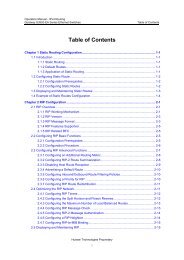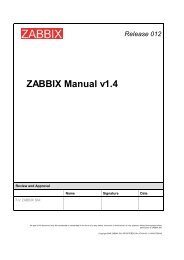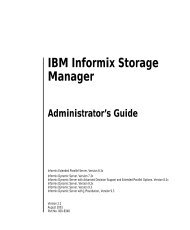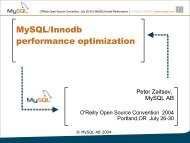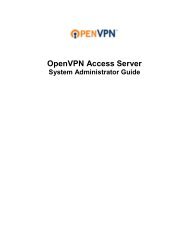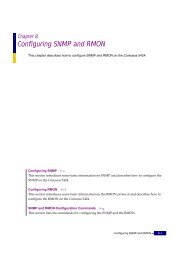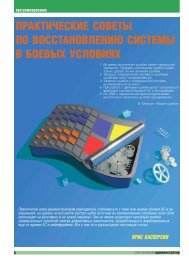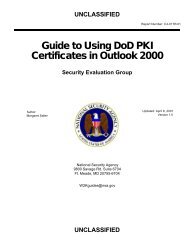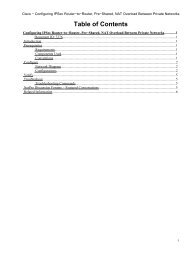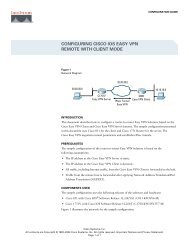Solaris Application Programming, 1/e - Chapter 4 - Parent Directory
Solaris Application Programming, 1/e - Chapter 4 - Parent Directory
Solaris Application Programming, 1/e - Chapter 4 - Parent Directory
Create successful ePaper yourself
Turn your PDF publications into a flip-book with our unique Google optimized e-Paper software.
80 <strong>Chapter</strong> 4 Informational Tools<br />
Example 4.41 Output from pstack<br />
% sleep 10 &<br />
[1] 4556<br />
% pstack 4556<br />
4556: sleep 10<br />
ff31f448 sigsuspend (ffbffaa8)<br />
00010a28 main (2, ffbffbdc, ffbffbe8, 20c00, 0, 0) + 120<br />
000108f0 _start (0, 0, 0, 0, 0, 0) + 108<br />
4.4.11 Tracing <strong>Application</strong> Execution (truss)<br />
truss is a useful utility for looking at the calls from an application to the operating<br />
system, calls to libraries, or even calls within an application. Example 4.42<br />
shows an example of running the application ls under the truss command.<br />
Example 4.42 Output of the truss Command Running on ls<br />
$ truss ls<br />
execve("/usr/bin/ls", 0xFFBFFBE4, 0xFFBFFBEC) argc = 1<br />
mmap(0x00000000, 8192, PROT_READ|PROT_WRITE|PROT_EXEC,<br />
MAP_PRIVATE|MAP_ANON, -1, 0) = 0xFF3B0000<br />
resolvepath("/usr/bin/ls", "/usr/bin/ls", 1023) = 11<br />
resolvepath("/usr/lib/ld.so.1", "/usr/lib/ld.so.1", 1023) = 16<br />
stat("/usr/bin/ls", 0xFFBFF9C8) = 0<br />
open("/var/ld/ld.config", O_RDONLY) Err#2 ENOENT<br />
open("/usr/lib/libc.so.1", O_RDONLY) = 3<br />
fstat(3, 0xFFBFF304) = 0<br />
....<br />
When an application is run under truss the tool reports every call the operating<br />
system made. This can be very useful when trying to determine what an application<br />
is doing. The -f flag will cause truss to follow forked processes.<br />
When truss is run with the -c flag it will provide a count of the number of<br />
calls made, as well as the total time accounted for by these calls. Example 4.43<br />
shows the same ls command run, but this time only the count of the number of<br />
calls is collected.<br />
Example 4.43 Call Count for the ls Command Using truss<br />
$ truss -c ls<br />
syscall seconds calls errors<br />
_exit .000 1<br />
write .000 35<br />
open .000 7 3<br />
close .000 4<br />
time .000 1<br />
brk .000 10




